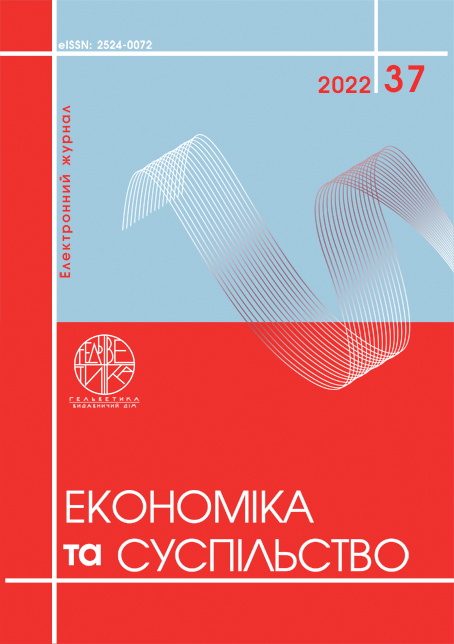MODERN COST CONTROL TOOLS IN CONDITIONS OF LIMITED RESOURCES
Abstract
The article is devoted to topical issues of essence and tasks of cost control as a component of the company 's financial controlling system. Features of introduction and application of the basic methods of controlling of expenses at the domestic enterprises in the conditions of limited resources (both material, and financial and intellectual) are covered. Modern business conditions for domestic enterprises are characterized by complexity, limited resources, changing environment, increased risks and increased competition, due to the rapid pace of scientific and technological progress around the world. All these factors force the enterprises of Ukraine to increase the efficiency of activity management, which would allow not only to timely adapt to changing environmental conditions, but also to ensure the stable development of the enterprise. Costs are characterized by separate classification features and the necessity of controlling costs under changing management conditions is substantiated. The purpose of cost management is to reduce or optimize the cost of manufacturing products and increase the profitability of the enterprise. One of the most important prerequisites for the introduction of controlling in enterprises is a thorough study and improvement of the existing system of operational controlling indicators. It is the basis of operational control activities of the enterprise and helps to regulate the processes of the enterprise. The authors substantiate the need to introduce cost controlling at a domestic enterprise to increase the efficiency of its activities based on the use of modern tools and approaches to minimize costs in modern conditions. Performance indicators of the enterprise with the use of modern forecasting tools are predicted.
References
Податковий кодекс України від 02.12.2010 №2755-VI. URL: https://zakon.rada.gov.ua/laws/show/2755-17#Text.
Положення (стандарт) бухгалтерського обліку 16 «Витрати» (П(С)БО 16), затверджене наказом Мінфіну 31 грудня 1999 року № 318. URL: https://kodeksy.com.ua/buh/psbo/16.htm.
Бланк І.А. Фінансовий менеджмент : навч. посіб. Київ : Ніка-Центр, 2009. 528 с.
Бутинець Ф.Ф. Витрати виробництва та їх класифікація для потреб управління. Проблеми теорії та методології бухгалтерського обліку, контролю і аналізу. 2012. Вип. 1 (22). С. 11–18.
Корбутяк А.Г., Шевчук Ю.О. Фінансовий контролінг як складова управління фінансами підприємства. Науковий вісник Ужгородського університету. 2021. Вип. 39. C. 89–94. URL: http://visnyk-econom.uzhnu.uz.ua/index.php/2021
Мілаш І.В., Гаркуша Н.М. Управління витратами підприємств роздрібної торгівлі за центрами відповідальності. Проблеми економіки. 2017. № 4. С. 113–117.
Одинцова Т.М. Контролінг витрат у системі забезпечення збалансованого сталого розвитку підприємства. Вісник Університету Банківської Справи Національного Банку України. 2018. № 1 (13). С. 106–109.
Офіційний веб-сайт «Євро-Модуль». URL: https://www.euro-modul.com.ua. (дата звернення: 12.06.2021).
Паскалова А.Г. Класифікація витрат підприємства відповідно до функцій та завдань контролінгу. Бізнес Інформ. 2019. № 2. С. 212–217.
Погорєлов І.М., Сахно А.В. Фінансовий контролінг як основа ефективного управління фінансами. Збірник наукових праць "Вісник НТУ "ХПІ": Технічний прогрес та ефективність виробництва. 2019. № 34. С. 173–177.
Сабліна Н.В. Контролінг в управлінні витратами підприємств : монографія. Укр. держ. акад. залізн. трансп. Харків : УкрДАЗТ, 2010. 263 с.
Штрайт Б., Петрик О. Контролінг і управління підприємством. Бухгалтерський облік і аудит. 2015. № 5. С. 32–35.
Янковий О.Г., Кошельок Г.В. Фактори формування прибутку підприємства. Вісник соціально-економічних досліджень. 2018. Вип. 3(43). С. 298–305.
“Why isn’t the Controller Having More Impact?”, Schuemann, Jon. Strategic Finance. 1999. Aрril. Р. 32.
Brown, A. Technological and organizational influences on the adoption of activity-based costing in Australia / A. Brown, P. Booth, F. Giacobbe // Accounting & Finance. 2004. Vol. 44, No. 3, P. 205–258.
Podatkovyi kodeks Ukrainy vid 02.12.2010 №2755-VI [Tax Cod Of Ukraine]. Available at: https://zakon.rada.gov.ua/laws/show/2755-17#Text. (in Ukrainian)
Polozhennia (standart) bukhhalterskoho obliku 16 «Vytraty» (P(S)BO 16), zatverdzhene nakazom Minfinu 31 hrudnia 1999 roku. [Regulation (standard) of accounting 16 "Costs"]. Available at: https://kodeksy.com.ua/buh/psbo/16.htm. (in Ukrainian)
Blank I.A. (2009) Finansovyi menedzhment [Financial Management]: navch. Posib [tutorial]. Kyiv: Nika-Tsentr, 528 p. (in Ukrainian)
Butynets F.F. (2012) Vytraty vyrobnytstva ta yikh klasyfikatsiia dlia potreb upravlinnia [Production costs and their classification for management purposes]. Problemy teorii ta metodolohii bukhhalterskoho obliku, kontroliu i analizu. Vol. 1 (22). P. 11–18. (in Ukrainian)
Korbutiak A.G., Shevchuk Yu.O. (2021) Finansovyi kontrolinh yak skladova upravlinnia finansamy pidpryiemstva [Financial controlling as a component of enterprise financial management]. Naukovyi visnyk Uzhhorodskoho universytetu. Vol. 39. P. 89–94. Available at: http://visnyk-econom.uzhnu.uz.ua/index.php/2021 (in Ukrainian)
Milash I.V., Harkusha N.M. (2017) Upravlinnia vytratamy pidpryiemstv rozdribnoi torhivli za tsentramy vidpovidalnosti [Cost management of retail enterprises by centers of responsibility]. Problemy ekonomiky. № 4. P. 113–117. (in Ukrainian)
Odyntsova T.M. (2018) Kontrolinh vytrat u systemi zabezpechennia zbalansovanoho staloho rozvytku pidpryiemstva [Cost control in the system of ensuring sustainable development of the enterprise]. Visnyk Universytetu Bankivskoi Spravy Natsionalnoho Banku Ukrainy. №1 (13). P. 106–109. (in Ukrainian)
Ofitsiinyi veb-sait «Ievro-Modul». Available at: https://www.euro-modul.com.ua.
Paskalova A.G. (2019) Klasyfikatsiia vytrat pidpryiemstva vidpovidno do funktsii ta zavdan kontrolinhu [Classification of enterprise costs in accordance with the functions and tasks of controlling]. Biznes Inform. №2. P. 212–217. (in Ukrainian)
Pohorielov I.M., Sakhno A.V. (2019) Finansovyi kontrolinh yak osnova efektyvnoho upravlinnia finansamy [Financial controlling as a basis for effective financial management]. Zbirnyk naukovykh prats "Visnyk NTU "KhPI": Tekhnichnyi prohres ta efektyvnist vyrobnytstva. № 34. P. 173–177. (in Ukrainian)
Sablina N.V. (2010) Kontrolinh v upravlinni vytratamy pidpryiemstv: monohrafiia [Controlling in the management of enterprise costs: monograph]. Ukr. derzh. akad. zalizn. transp. Kharkiv: UkrDAZT, 263 p. (in Ukrainian)
Shtrait B., Petryk O. (2015) Kontrolinh i upravlinnia pidpryiemstvom [Kontroling and Management of Enterprise]. Bukhhalterskyi oblik i audyt. Vol. 5. P. 32–35. (in Ukrainian)
Iankovyi O.H., Koshelok H.V. (2018) Faktory formuvannia prybutku pidpryiemstva [Factors of Enterprise Profit Formation]. Visnyk sotsialno-ekonomichnykh doslidzhen. Vol. 3(43). P. 298–305. (in Ukrainian)
“Why isn’t the Controller Having More Impact?”, Schuemann, Jon. Strategic Finance. 1999. Aрril. Р. 32.
Brown, A. Technological and organizational influences on the adoption of activity-based costing in Australia / A. Brown, P. Booth, F. Giacobbe. Accounting & Finance. 2004. Vol. 44, No. 3. P. 205–258.


